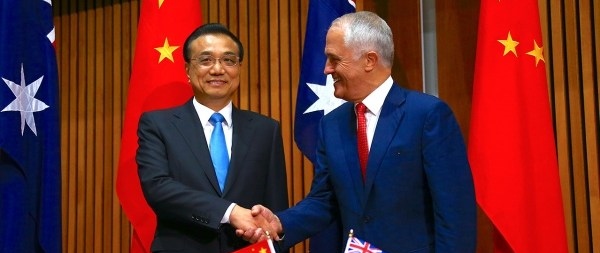Australia’s Foreign Interference Bill
June 28, 2018 | Expert Insights

Australian lawmakers are expected to pass a legislation to limit and prevent foreign interference in the country on the 28th of June. Rules, similar to that of the US, will require registration of foreign lobbyists and to empower the judiciary to persecute them if found meddling in domestic affairs.
The law comes in light of growing tensions between Australia and China.
Background
Aboriginal Australians arrived on the Australian mainland by sea from Maritime Southeast Asia between 40,000 and 70,000 years ago. The artistic, musical and spiritual traditions they established are among the longest surviving such traditions in human history. Portuguese, Spanish and Dutch explorers attempted to cross the Torres Straits, but deemed the barren land as having no value.
In 1770, Captain James Cook of the British Royal Navy took possession of the eastern coast of Australia in the name of George III. The colony of New South Wales was formally proclaimed only in 1788. Transportation of convicts eventually brought a total of about 160,000 prisoners to Australia. The initial character of a penal colony lasted for about 60 years in the areas of major original settlement. Convicts began fishing and agriculture. Roads, bridges, and other transportation facilities necessary for commerce were built by convict labor, as were government buildings.
The Australian colonies became self-governing while undergoing great changes caused by the discovery of gold in 1851. Gold was, in fact, a cause for the change in attitude of the British government, which considered that the increasing wealth as well as the growing population of the colonies justified their assumption of political responsibility.
In the post-World War II-era, Australia’s foreign policy became more closely aligned with the United States than with Britain. Another foreign policy theme has been collective security. Australian forces participated in the Korean War (1950–53) in support of the United Nations (UN)-sponsored campaign. In 1951 Australia signed the Australia-New Zealand-United States (ANZUS) Security Treaty, which committed the three nations to mutual defense.
Upon taking power in 2015, Turnbull toughened up Australia’s stance against China by criticizing its expansionist policies in the South China Sea. Five months later his government cited the growth of “China’s national power” to bolster defense spending.
In December of 2017, Turnbull chose to quote Chinese political scripture, insisting that the laws were about Australians “standing up” against foreign interference, just as Chinese leader Mao Zedong is said to have declared the Chinese people had done at the formation of the People’s Republic in 1949. The China’s foreign ministry in Beijing said they were “shocked by the Australian leader’s remarks”.
Analysis
A flurry of recent media reports alleged that China’s Communist Party (CCP) was covertly meddling with media, universities and lawmakers. In response to this, the Australian government has introduced legislation to clamp down on foreign interference in politics and business.
Introduced with the Foreign Influence Transparency Scheme (Charges Imposition) Bill 2017, the bill requires registration by certain persons undertaking certain activities on behalf of a foreign principal while disclosing the nature of their relationship with the foreign entity. Legislation to ‘counter the threat of foreign states exerting improper influence’ in Australia has also been introduced to Senate.
“We will always assert our national interests, and we expect other countries to do the same,” PM Malcolm Turnbull stated. “Our rejection of covert, coercive or corrupting behaviour leads naturally to a counter-foreign-interference strategy that is built upon the four pillars of sunlight, enforcement, deterrence and capability.”
China has been arguably the single most important engine behind Australia’s economic growth in the past two decades. It has been the leading trade partner for Australia for many years, Chinese tourists and students have become a major source of revenues for many Australian businesses and universities, and Chinese investment has created thousands of jobs. China accounted for 29% of Australia’s two-way commerce in 2016.
On the other hand, while the benefits, such as cheap imports, of bilateral trade are widely distributed, its costs, especially jobs, are narrowly concentrated, and the latter has undoubtedly resulted in growing resentment among those who have been adversely affected. Thus, China and Australia’s ties, primarily determined by ANZUS alliance, is weakening with globalisation.
“China understands it can use economic leverage to get us to shift our foreign policy and turn down our rhetoric,” said Malcolm Davis, a senior analyst at the Australian Strategic Policy Institute and a former adviser to the government on defense policy.
Tensions have risen since the resignation of Labour Party Senator Sam Dastyari over connections with the Chinese Communist Party (CCP) through businessman Huang Xiangmo, a foreign donor to the party. Dastyari has contradicted Labour party views on the South China Sea. After quitting, he went on to inform Xiangmo of his phone being tapped.
PM Turnbull has since pushed for legislation to ban foreign donors for political parties. However, this action, according to the US Chamber of Commerce in Australia, is detrimental to US lobbying interests in the country. The Law Council of Australia, media organisations, charities and even universities have also accused the government of overreach and impinging on freedom of expression.
Counterpoint
In the likelihood of Chinese political interference, there is little to be gained for China. Australia, on the other hand, will face backlash as the legislation is possibly the only modern law against foreign interference.
Assessment
Our assessment is that Australia cannot risk losing out on their closest trading partner. We believe that the Chinese will retaliate to any such move which could damage both economies. Moreover, US funds large lobby groups in the country which may be affected as criminal persecution may not be treated lightly by the US.








Comments